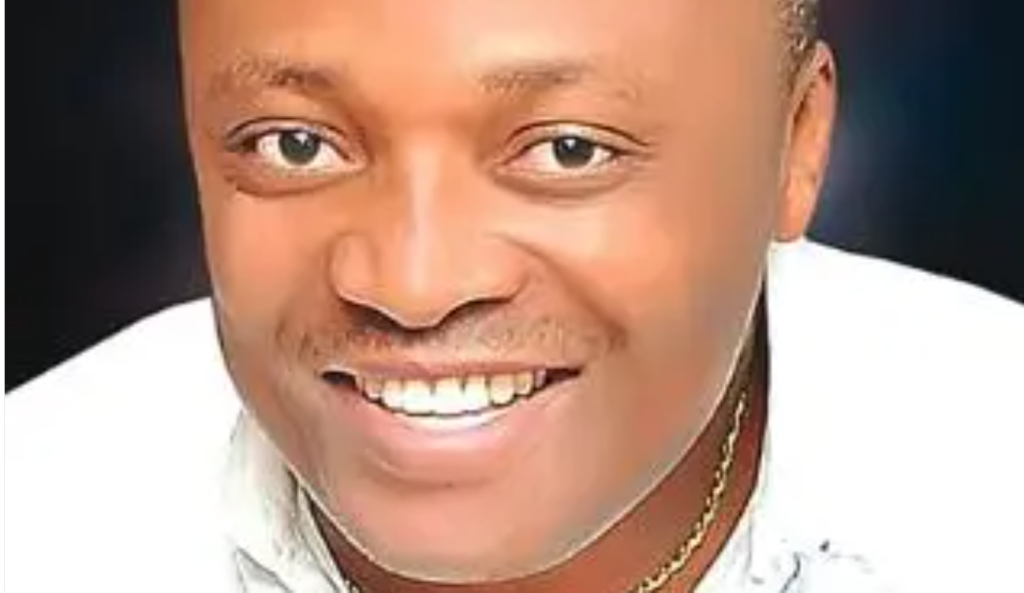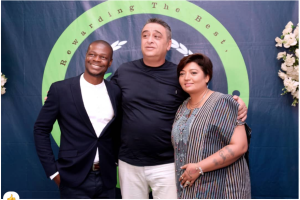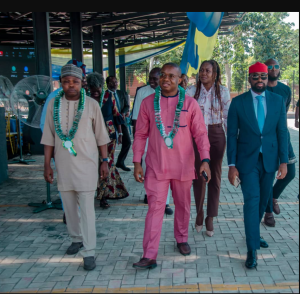

Mr. Emmanuel Ekon, a two-term member of the House of Representatives, who represented Abak/Etim Ekpo/Ika Federal Constituency of Akwa Ibom State in the National Assembly, was Chairman of the powerful House Committee on Local Content.
In this interview, Ekon advocates the replication of the local content law for other critical sectors of the economy such as ICT, Solid Minerals, agriculture, etc . He is convinced that if the law is extended to the other sectors of the economy, Nigeria would be creating at least one million new jobs each year.
Ekon, who contested for the Senatorial seat of the Akwa Ibom North Senatorial District of Akwa Ibom State on the ticket of the Young Progressives Party, YPP, in the 2023 election, also responds to claims that he contested against the Senate President, Godswill Akpabio, his political godfather.
You appear to have disappeared from the political radar after the 2023 elections. Why?
Well, I’m still around . Of course, after the 2023 elections and all that, I’ve decided to just, I won’t say retire, just stay at home and watch events as they unfold. You know, in 2023, I ran for Senate on the platform of YPP. By that time, it was just a movement in Akwa Ibom, which I believe you know. It was an assemblage of politicians from different political platforms, the PDP, the APC, and all those people who were denied tickets by their parties. So since then, I’ve returned to the sidelines watching how the political climate plays out.
What exactly led you to leave the PDP, and then APC to YPP where you contested for the Senate seat?
I went to the House of Representatives in 2011 on the platform of the PDP. And in 2015, I contested my second term on the platform of PDP . So I won my re-election on the PDP ticket, and I went back to the House of Representatives on that same platform. And I served from 2015 to 2018. In 2018, my boss, Senator Godswill Akpabio, the then the minority leader, left the PDP and joined the APC. And I was one of those people who went with him. As a loyal and committed person to him, I had to go with him.
Indeed, I could not have done otherwise. I’m not also regretting because there was nothing I could have done than to show utmost loyalty to a man who brought me up politically. I remember when I came in 2011, I was not a practising politician. I had never before then been on the ballot in any election, and was never an active politician anywhere. But as a governor then, he assisted me to get the party ticket to the House of Representatives. So for me, whatever I am politically, whatever I have attained politically was made possible by God through Senator Godswill Akpabio, the then governor of Akwa Ibom State.
That must be made very clear. That was why I had to follow him when he left PDP for the APC in 2018, and we were on the ballot in 2019. I contested for the House of Representatives on the platform of the APC while Senator Akpabio contested for the Senate on the APC ticket. But it turned out to be one of the most turbulent and expensive elections one cannot forget in a hurry. In fact, in the history of my political career, I would say that that election drained me so much. But we did well because within three months, I personally, with the help of the youths, turned the federal constituency from the PDP to the APC. It was a record-breaking achievement for us because as a member of the House of Representatives for two terms, I don’t think anybody dead or alive in that federal constituency has come close to what we did. I stand to be challenged on my performance as a representative of that federal constituency in Akwa Ibom State. Immediately after me, two people have come to the House of Reps and I stand to be challenged if there is anybody that has come close to that record.
So we did well. And because of what we did, we had a lot of followers who believed in us to the extent that in 2019, it was a mass movement for APC in Abak/Etim Ekpo/Ika Federal Constituency of Akwa Ibom State. We actually won the election. Even the PDP has attested to it today that we actually won. But then it was a system thing. The system didn’t want us, didn’t want the APC in the state to survive. Maybe, I think it was my boss, Akpabio, that they did not want at that time. And in trying to stop him, they wiped away the entire APC structure in Akwa Ibom state. So we all lost. And in 2019, Senator Godswill Akpabio was nominated as a Minister for Niger Delta. And he worked as a minister for two years, or three years, before he resigned and picked up the presidential nomination form. I have always been with Akpabio since he brought me into politics. If you go back to when he went for that ministerial screening, I was the only person who was allowed into the chambers of the Senate with his folder. And even when he became the substantive Minister of Niger Delta, I was always with him, planning things together, in recognition of the fact that he spearheaded my entry into politics.
But how did you end up in YPP as a candidate?
Well, I can say that I did not actually defected to YPP as such, but the party lured me to come over as an expert to improve its political fortunes given my pedigree in that federal constituency. Like I tell people, it was just like someone hiring an expatriate to come and help when they are in trouble. You hire an expert to come, and then solve the problem or sort out the issues, and go back to his home country. So that was the issue of YPP.
YPP was a movement that broke out of PDP after the contentious gubernatorial primaries between Senator Bassey Albert and Governor Udom Emmanuel. As you may know, Albert Bassey was the most acceptable aspirant for that election in the PDP but because the governor denied him that ticket, he left the PDP and formed that YPP movement. So when that movement was formed, they were looking for credible people across federal constituencies, state constituencies, in the state to come together and form that movement.
So that was how they approached me to come in, and be their senatorial candidate for Ikot Ekpene Senatorial District. Even though I did not have the money, YPP convinced me to be on their ballot, and I reluctantly accepted the offer.
But at that time, did you consult Akpabio, your political godfather?
Indeed, I consulted him many times. Even before that time, I remember when he invited me to come in and sign his presidential nomination form. I remember that day vividly that I told him that he should rather run for Senate, not presidency. I told him that I did not think he stood a better chance in the presidential race. I actually suggested to him to go for the Senate instead of the Presidency. We had been talking. And the reason why I said that was very clear. Of course, everybody in Akwa Ibom knows that Akpabio wouldn’t have been defeated in the senate election. He was simply robbed in 2019. And the PDP and the machinery that they used in robbing him made the whole world believe that he lost the election.
So for me, as his loyalist, in 2023, I suggested that he should go and clear his name. I encouraged him to go and take ownership of the senatorial seat this time, so that people will know that he did not fail that election in 2019 , but he was robbed. So that was my advice to him. And I mean, I don’t think my boss can say I didn’t do that. I went to him the day I signed his nomination form for presidency and told him that he should consider going to the senate instead of the presidency. But I guess he didn’t take that advice.
And, when YPP gave me the form, I also went to him. I remember that night, it was about 12:30 a.m. I went to his guest house in Apo. We sat down there from 12:30 in the morning till four o’clock in the morning. And I told him that YPP had given me a ticket to run for Senate. He told me clearly that he was not going to run but would only support the then governor of Cross River State, Prof Ben Ayade, so as to be able to become the Senate President, which the APC would zone to the South-South.
So I told Akpabio that if he decided to go for the Senate, I, Emmanuel Ekon, would never run against him. I assured him that I would step down for him at any time he made up his mind to run for the Senate. So there was nothing like running against Akpabio. I would never bite the finger that feeds me. Incidentally, the ticket was zoned to Abak Federal Constituency that has never before then produced a Senator, and it would have been very easy for me as the person who represented the constituency for eight years in the House of Representatives.
Like the Senate presidency was zoned to South South, there is no way I would have contested for Senate presidency if I was to be in the Senate. But with him, it would have been possible for him to contest, to run for that office, because he has a big name, having been Commissioner, Governor, Senator and Minister. So it was only right for him to become the Senator.
So it’s not that I would have just deliberately gone and contested an election against my political godfather. Why would I do that? So we had that agreement, that if he goes for the Senate I would step down for him; and he agreed.
But the problem we had was that by the time Akpabio finally decided to run for the Senate, I had already done serious consultations with the key stakeholders in the Senatorial district. But he never spoke to me again that he had left the presidential race for the Senate race. So I was confused, knowing exactly our previous conversation on the matter. And, even my party, the YPP that gave me the ticket, also went and negotiated my own seat and sold the slot to him without letting me know. So they pulled the rug off my feet, and directed the entire party structure in Ikot Ekpene senatorial district to vote APC instead of YPP. So, I was not really perturbed because I already said I won’t run against him despite the fact that he did not signal to me the direction I should go after he entered the race.
So that was how he cruised to victory. And after the election, I called him to congratulate him. I was the first person that called him, of all the people that contested the election with him, I was the first person that called because I never had any issue with him. There is no way I would have stood an election with him anyway, but he made me do so because I didn’t want people to look at me as if I was lying to them because there will always be consequences for any political action that you take.
But there’s this allegation now, from his supporters that you actually betrayed him, worked against him by contesting that election against him.
No, there was nothing like betraying him. I don’t know what they mean by betraying. I never betrayed him. He remains my boss and political leader till tomorrow. We had that gentleman’s agreement that if he would run for the senatorial seat, I would withdraw for him; and I did not change my mind. I recognise the role he played in my life and it is not something I would ever forget.
But what is your relationship with him now?
He is my leader. I don’t have any problem with him. If in 2027, he finishes his Senate presidency and wants to run for the same office, I would be his campaign manager if he wants me to. I don’t have any problem with him.
Politically, we are not mates but I don’t just want people to carry some wrong impression that I betrayed him. No, I did not betray him. They were not there when we struck an agreement but of course, you know there are individuals out there that would want to portray me in a very bad light so that he would probably see me as unloyal.
You were the chairman of the House Committee on Local Content. What value did you add to job creation when you held that key position?
Well, I will say to the best of my ability as a patriotic Nigerian who also had an opportunity to chair the local content committee in the House of Representatives between 2015 and 2019, with my committee members, we did our very best to add value, especially in the oil and gas industry of this country.
I will say one notable value that we added was that we assisted a lot of local oil servicing companies in this country to thrive. I can tell you that I personally settled a lot of rifts between the International Oil Companies and the local companies, and ensured that contracts that were before then awarded to foreign companies, were given to Nigerian companies. In fact, I want to use Intel as an example. It was the Local Content committee under my leadership that fought Intel to a standstill when they laid off the 13 Nigerian staff, and brought in some so-called expatriates that did not even know their left from their right. I fought Intel to standstill and the rest is history. I know that under me, I deported nothing less than 100 plus expatriates that were not supposed to be in this country, that were taking Nigerian jobs. I deported all of them, replaced them with Nigerians. I know that under me, in my own federal constituency there, I trained nothing less than 500 people in oil and gas-related trades such as scaffolding, welding, painting, diving and so on.
My committee was responsible for the establishment of the Oil and Gas Park in Akwa Ibom. There is also a welding workshop there at the Akwa Ibom State Ministry of Science and Technology. I made sure the multinationals did that for me as their Corporate Social Responsibility, CSR. We also established a multi-million ICT, Welding, wood factory, electrical engineering, building technology and ICT Centre at the Government Technical College Abak to help the children in gaining practical knowledge.
I would say that before the assent to the local content law, 90% of the entire contracts and subcontracts were given to foreign companies. Apart from that, all the vessels that were supporting operations in oil and gas within our territorial waters were owned by foreigners. Now since that law came into effect, I would say that the reverse is the case; that 90% of the vessels today in our territorial waters that are supporting oil and gas operations are owned by Nigerians. We did that. We made sure that happened.
The law provides for a single-digit loan so that Nigerians can access funds to provide some of these services to the oil and gas sector. Because it is not just about having oil and gas, we are rich in oil and gas, but the local industry players were not benefitting. The people were not benefitting from the services within the oil and gas industry. The services were still done pretty much by the foreigners.
We should be very grateful to President Goodluck Jonathan who promptly signed the bill into law and liberated the oil and gas sector of the Nigerian economy from shackles of foreign domination. I gave it to him because some other people would have delayed the signing of that law, but he signed it into law and that law changed the entire oil and gas industry operations in Nigeria.
That is why there are many Nigerian millionaires from the oil and gas industry virtually everywhere.
How can that law be made to help out in the current economic situation in Nigeria?
That is why I advocate that the same law should be made for other vital sectors of the economy.
I strongly believe that diversifying that local content law to other critical sectors of the economy is crucial at this point in time.
Already, the one we did is adding significant value to the oil and gas sector by helping more and more Nigerians to get jobs and build capacity. As a result of that local content law, there are indigenous companies that can provide critical services within the oil and gas industry. We don’t need to go outside to call foreign companies or expatriates.
When we came in, there were no sea divers; there was no sea diver that could go down 100, 1,500 feet beneath the sea level. There was none. So if anything happened, maybe there’s a pipe leakage underneath the water, we would have to go to Europe or America to find an expert to come and take care of that.
Among the things we did was the training of Nigerians who could handle deep sea diving for the oil and gas industry. As a country we can say that we have boys that can go down and take care of those kinds of welding if we have those kinds of issues. As a country, we can tell you that we have enough vessels in the country that can handle oil and gas operations, indigenous vessels. As a country, we can say that the entire oil and gas industry, when it comes to artisanal jobs, that we have enough hands that can take care of. Before now, little things like artisanal jobs, electricians, plumbers, fitters were foreigners. So, we have recorded fabrication yards. We did not have fabrication yards. Maybe our fabrication capacity when we came in was like 30%. But today, I can say that we’re about 70% of the country’s fabrication capacity. So, we’ve recorded successes in that industry.
So, with all these experiences, why can’t we diversify into other critical sectors like solid minerals manufacturing, telecoms, ICT, agriculture and mining to make more money for the country? Today, in Abuja, you and I are sitting on a multi-billion-dollar mineral underneath Abuja and yet nobody is talking about it. Everybody is concentrating on oil and gas. And yet, some foreigners, especially from Asia, will just come here and take our minerals and go back to their countries and become millionaires. We really do not need to depend on oil and gas alone, which cannot fund the economy and provide enough resources for all Nigerians. That is my idea. Why can’t we make the local content law to apply to telecoms operations in Nigeria? For example, who are the people laying the fiber optics in Nigeria? Who are the producers of common stuff like SIM cards in Nigeria? It is globally adjudged that Nigeria is the biggest subscriber of GSM network in the whole of Africa today. Nigeria is number one because just about every Nigerian has at least two SIM cards. But, what have we gained as a people in the country? Common SIM card, we don’t even know where it is produced. Can you imagine if a SIM card, just a SIM card, is produced in Nigeria, how many people will be gainfully employed in that factory? And how much money will those Nigerians make? That is why Nigeria should consider replicating the local content law for other vital sectors of the economy.
People are complaining about the high cost of governance in Nigeria. What can be done to reduce the cost of governance?
The President has started the process of reducing the high cost of governance by revisiting the Oronsaye Report, which outlined many areas of waste in government. Efforts should be made to implement it and ensure that wastages are seriously curtailed in the country.









